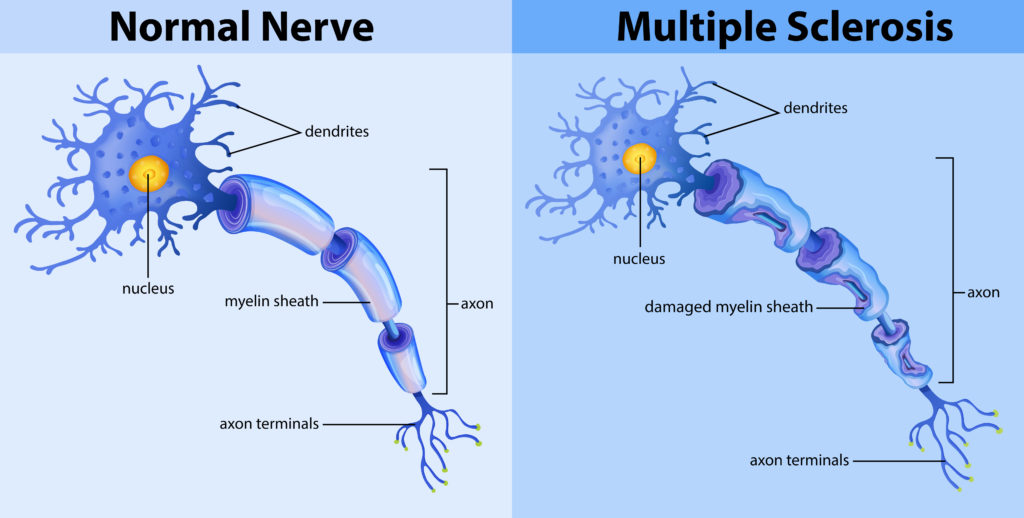Can MS Cause Sciatic Nerve Pain: Unraveling the Connection
The Answer: Yes, Multiple Sclerosis (MS) can cause sciatic nerve pain.
Can MS cause sciatic nerve pain? This question often haunts those grappling with the complexities of multiple sclerosis and the accompanying symptoms. Sciatic nerve pain, known as sciatica, can be a debilitating condition, causing sharp, shooting pains that radiate down the leg, often accompanied by tingling or numbness. While sciatica is commonly associated with conditions like herniated discs or spinal stenosis, the possibility of MS exacerbating or directly causing sciatic nerve pain should not be overlooked. Let’s delve into the relationship between MS and sciatica, exploring the evidence and implications for those affected.
Understanding Multiple Sclerosis (MS)
Multiple Sclerosis is a chronic autoimmune disease affecting the central nervous system. It occurs when the immune system mistakenly attacks the protective myelin sheath covering nerve fibers, leading to inflammation, lesions, and disruptions in nerve signals. The hallmark of MS is its unpredictable nature, with symptoms varying widely among individuals. Common symptoms include fatigue, muscle weakness, difficulty walking, and problems with coordination and balance.

The Link Between MS and Sciatic Nerve Pain
- Nerve Compression and Inflammation
MS lesions in the spinal cord can compress or irritate the sciatic nerve, leading to pain. Research suggests that inflammation associated with MS can contribute to nerve compression, exacerbating sciatic symptoms. - Altered Gait and Posture
MS-related muscle weakness and coordination issues can result in altered gait and posture, placing increased stress on the lower back and pelvis. This altered biomechanics can trigger or worsen sciatic nerve pain. - Neurological Symptoms
MS can cause neurological symptoms such as tingling, numbness, or burning sensations, which may mimic or exacerbate sciatic nerve pain. These sensations can radiate down the leg, mimicking the classic symptoms of sciatica.
Scientific Evidence Supporting the Connection
Numerous studies have explored the relationship between MS and sciatic nerve pain, shedding light on the underlying mechanisms and prevalence of this phenomenon.
A study published in the Journal of Neurology found that sciatica was more common in individuals with MS compared to the general population. Additionally, imaging studies have revealed spinal cord lesions in MS patients that coincide with areas responsible for sciatic nerve function, providing further evidence of the link between MS and sciatica.
Addressing Sciatic Nerve Pain in MS Patients
- Comprehensive Neurological Evaluation
For individuals with MS experiencing sciatic nerve pain, a thorough neurological evaluation is essential. This evaluation may include imaging studies such as MRI to assess for spinal cord lesions or nerve compression contributing to sciatica. - Multidisciplinary Treatment Approach
Effective management of sciatic nerve pain in MS patients often requires a multidisciplinary approach. This may include medications to alleviate pain and inflammation, physical therapy to improve strength and flexibility, and assistive devices or orthotics to support mobility and posture. - Lifestyle Modifications
Lifestyle modifications such as maintaining a healthy weight, practicing proper body mechanics, and incorporating regular exercise can help alleviate sciatic nerve pain and improve overall well-being in MS patients.
Conclusion: Navigating the Complexities
In conclusion, the answer to the question “can MS cause sciatic nerve pain” is unequivocally yes. The intricate interplay between MS-related neurological dysfunction and sciatic nerve pathology underscores the importance of comprehensive evaluation and tailored management strategies for individuals affected by both conditions. By understanding the connection between MS and sciatica and addressing it proactively, healthcare providers can better support the needs of their patients, enhancing quality of life and functional outcomes.
In the journey of managing MS and its associated symptoms, staying informed and connected to reliable resources is paramount. Medcareline.com offers a wealth of informational resources and support for individuals navigating the complexities of MS and related conditions. From expert articles to community forums, medcareline.com provides a holistic approach to empower individuals with knowledge and support on their healthcare journey.
In conclusion, while MS can indeed cause sciatic nerve pain, proactive management and comprehensive care can help individuals effectively navigate this challenging aspect of their condition.
Frequently Asked Questions
Q: How common is sciatic nerve pain in individuals with MS?
A: Studies suggest that sciatic nerve pain is relatively common among individuals with MS. While precise prevalence rates may vary, research indicates that it occurs more frequently in MS patients compared to the general population, highlighting its significance within the MS community.
Q: Are there specific risk factors within the MS population that predispose individuals to developing sciatic nerve pain?
A: Several factors may contribute to the development of sciatic nerve pain in individuals with MS, including the presence of spinal cord lesions, degree of inflammation, and severity of neurological symptoms. Additionally, factors such as age, disease duration, and specific MS subtype may also influence the likelihood of experiencing sciatica.
Q: What are the typical treatment approaches for managing sciatic nerve pain in MS patients?
A: Treatment for sciatic nerve pain in MS patients often involves a multidisciplinary approach tailored to individual needs. This may include medications such as pain relievers or anti-inflammatories, physical therapy to improve strength and flexibility, corticosteroid injections to reduce inflammation, and in severe cases, surgical intervention to alleviate nerve compression.
Q: Can sciatic nerve pain be a presenting symptom of MS, or does it typically occur after an MS diagnosis?
A: Sciatic nerve pain can manifest at various stages of MS, and its timing may vary among individuals. While it can be an early symptom prompting further investigation leading to an MS diagnosis, it may also develop later in the disease course as a result of progressive neurological dysfunction or exacerbation of existing symptoms.
Q: Are there any preventative measures individuals with MS can take to reduce the likelihood of developing sciatic nerve pain?
A: While it may not be possible to prevent sciatic nerve pain entirely in individuals with MS, adopting a proactive approach to managing MS symptoms and promoting overall health and wellness can help reduce the risk or severity of sciatica. This may include maintaining a healthy lifestyle, engaging in regular exercise to improve muscle strength and flexibility, practicing proper body mechanics to prevent injury, and adhering to prescribed disease-modifying therapies to manage MS progression.







